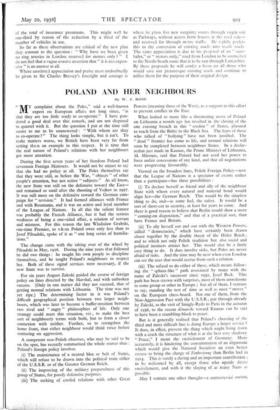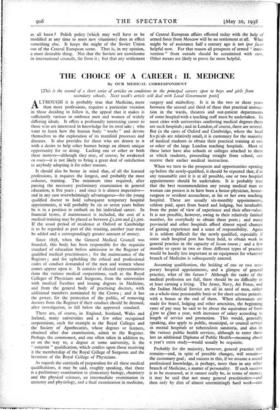POLAND AND HER NEIGHBOURS
By W. J. ROSE
" MY complaint about the Poles," said a well-known expert. on European affairs not long since, " is that they are too little ready to co-operate." I have pon- dered a good deal over this remark, and am not disposed to quarrel with it. But the question I put at the time still seems to me to be unanswered : " With whom are they to. co-operate ?" The thing looks simple, but it isn't. To make matters worse, we British have been very far from setting them an example in this respect. It is time that the real nature of Poland's relations with her neighbours got more attention.
During the first seven years of her freedom Poland had seventeen Foreign Ministers. It would not be unjust to say that she had no policy at all. The Poles themselves say that they were still, as before the War, " objects " of other people's attention, but not active " subjects." As all know, the new State was still on the defensive toward the East— and remained so until after the shooting of Vojkov in 1927. It was still more on the defensive toward the German cam- paign for " revision." It had formed alliances with France and with Roumania, and it was an active and loyal member of the League-of Nations. In all this the salient feature was probably the French Alliance, but it had the serious weakness of being a one-sided affair, a relation of servant and mistress. For this reason the late Wladislaw Grabski, one-time Premier, to v ham Poland owes only less than to Jozef Pilsudski, spoke of it as " one long series of humilia- tions."
The change came with the taking over of the wheel by Pilsudski in May, 1926. During the nine years that followed he did two things : he taught his own people to discipline themselves, and he taught Poland's neighbours to respect her. Both of these signal services were necessary, if the new State was to survive.
For six years August Zaleski guided the course of foreign policy on lines directed by the Marshal, and with unbroken success. (Only in one matter did they not succeed, that of getting normal relations with Lithuania. The time was not yet ripe.) The determining factor in it was Poland's difficult geographical position between two larger neigh- bours, which was later to become a buffer-position between two rival and " angry " philosophies of life. Only one strategy could meet this situation, viz., to make the best sort of neighbourly terms with both, but to form a closer connexion with neither. Further, so to strengthen the home front, that either neighbour would think twice before venturing on aggression.
A competent non-Polish observer, who may be said to be on the spot, has recently summarised the whole matter thus : Poland's foreign policy involves (i) The maintenance of a neutral bloc or belt of States, which will refuse to be drawn into the political train either Of the U.S.S.R. or of the Greater German Reich.
' (ii) The improving of the military preparedness of this group of .States, for purely defensive purposes.
(iii) The seeking of cordial relations with other Great Powers (meaning those of the West), as a support to this effort to prevent conflict in the East.
What looked to many like a threatening move of Poland on Lithuania a month ago has resulted in the closing of the one existing • breach in this " cordon " of States, planned to reach from the Baltic to the Black Sea. The fears of those who talked of " bullying " have not been justified. The " dead " frontier has come to life, and normal relations will soon be completed between neighbour States. In a declar- actibn just made in Kaunas, the Prime Minister of Lithuania, M. Mironas, said that Poland had not used her power to force unfair concessions of any kind, and that all negotiations were progressing favourably.
Viewed on the broadest lines, Polish Foreign Policy—now that the League of Nations is a spectator of events rather than a participant—has three possibilities : (i) To declare herself as friend and ally of the neighbour State with whom every natural and material bond would align her—the German Reich. This would be the simplest thing to do, and—as some feel, the safest. It would be a sort of short-cut to security, at least for years to come. And there is good reason to believe that Berlin would show a more " coming-on disposition," and that of a practical sort, than have France and Britain.
(ii) To ally herself out and out with the Western Powers, called " democracies," which have certainly been drawn closer together by the double threat of the Hitler Reich ; and to which not only Polish tradition but also social and political instincts attract her. This would also be a fairly easy thing to do. It does involve risks, but Poles arc never afraid of risks. And the time may be near when even London can see the uses that would accrue from such a relation.
(iii) The refusal to do either of these, which means follow- ing the " sphinx-like " path associated by many with the name of Zaleski's successor since 1932, Jozef Beck. This path has been strewn with surprises, most of them unwelcome to some group or other in Europe ; but all of them, I venture to say, standing the test of time as well as most " moves " on the European chess-board. Not one of them, from the Non-Aggression Pact with the U.S.S.R., put through already by Zaleski, to the visit of Smigly-Rydz to Paris in the autumn of 1936, to the recent demarche toward Kaunas can be said to have been a stumbling-block to peace.
But is it generally realised that Poland's choosing of the third and most difficult line is doing Europe a larger service ? It does, in effect, prevent the thing which might bring down with a crash the structure of what is at the best very shadowy " Peace," I mean the encirclement of Germany. More accurately, it is hindering the consummation of an alignment which would give the National Socialists an even better excuse to bring the charge of Einkreisung than Berlin had in 1914. This is surely a daring and an important contribution ; to be welcomed by all, except those who openly desire encirclement, and with it the slaying of as many Nazis as possible.
May I venture one other thought—a controversial matter, as all know ? Polish policy (which may well have to be modified at any time to meet new situations) does in effect something else. It keeps the might of the Soviet Union out of the Central European scene. That is, in my opinion, a most desirable thing. Not that the Soviets are unwelcothe in international councils, far from it ; but that any settlement of Central European affairs effected today with the help of armed force from Moscow will be no settlement at all. What might be of assistance half a century ago is not ipso facto helpful now. For that reason all prospects of armed " inter- vention " from outside should be scrutinised with care. Other means are likely to prove far more helpful.



















































 Previous page
Previous page